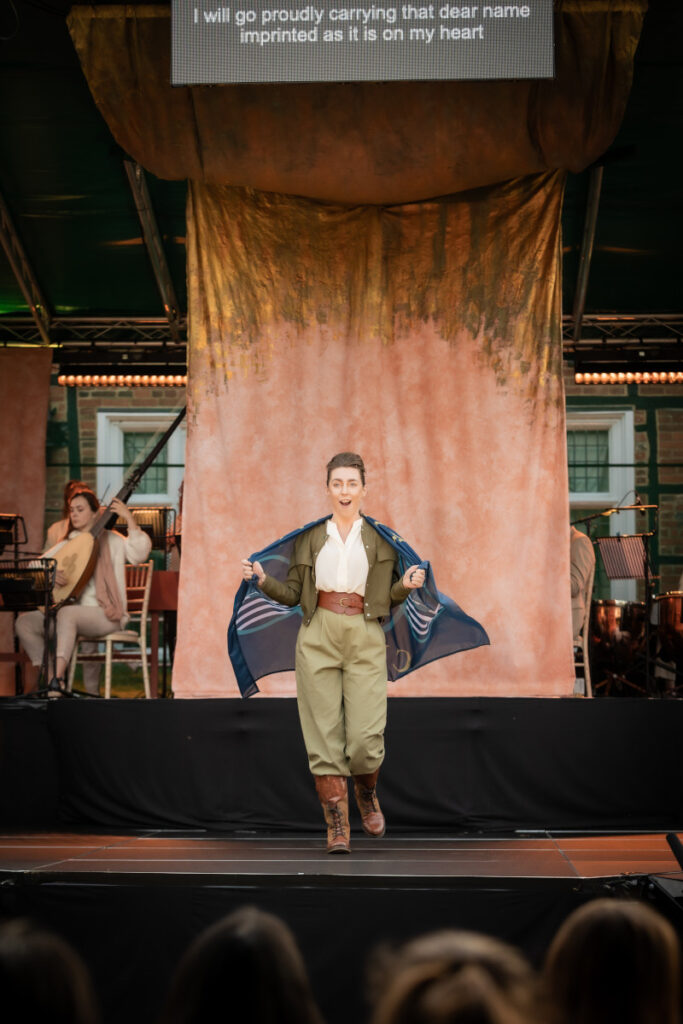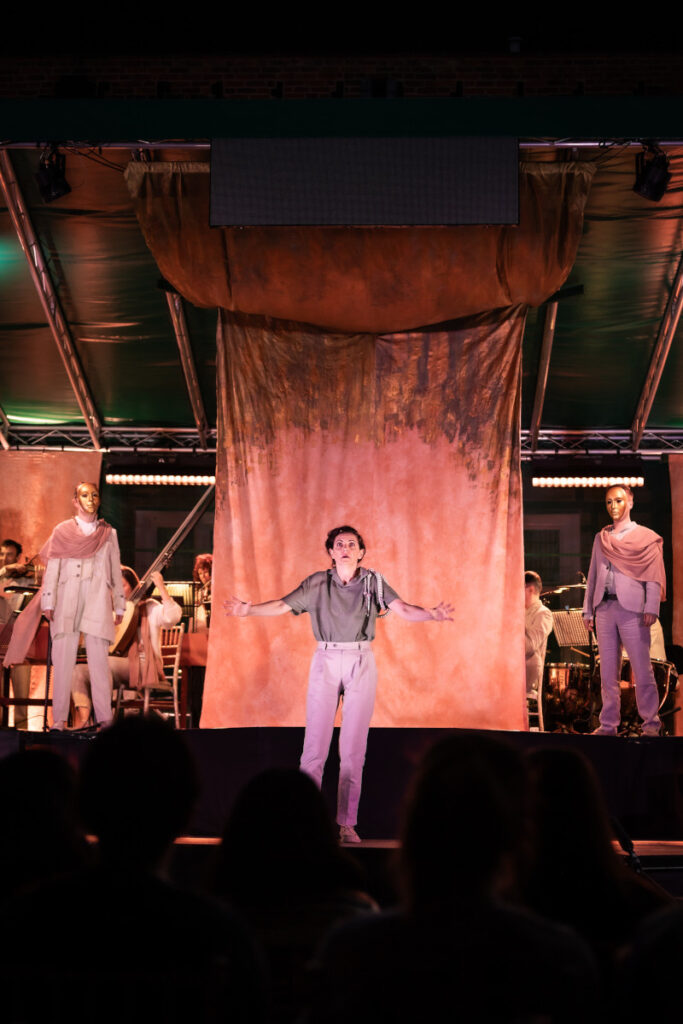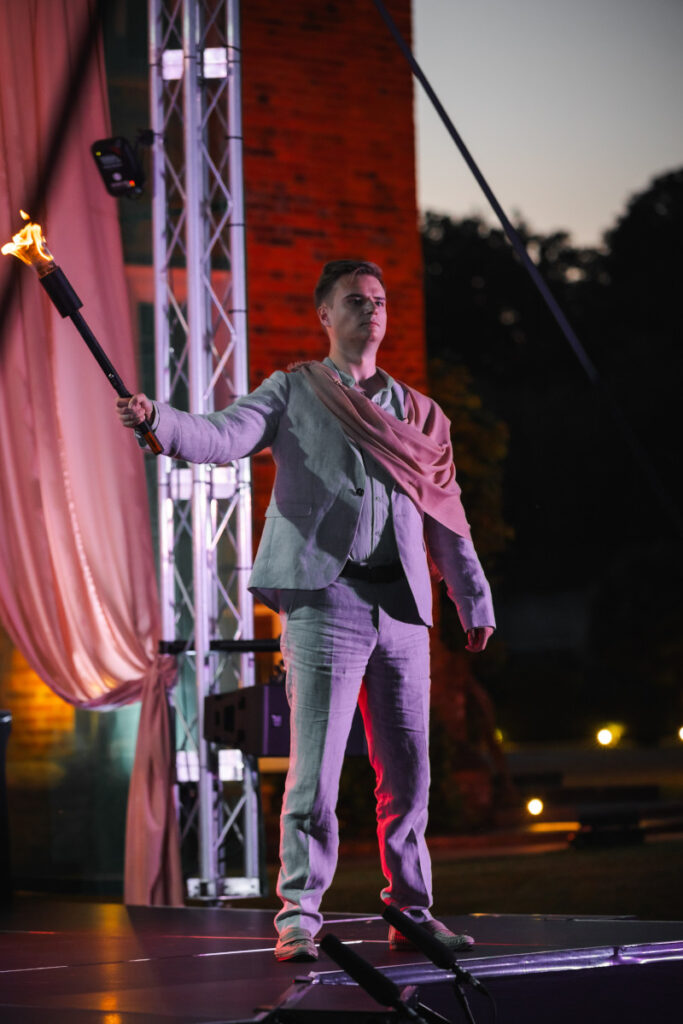As with so many librettos by Pietro Metastasio, L’Olimpiade was set numerous times during the 18th century. Like Vivaldi’s version (which audiences in London have also had the chance to see earlier on in this Olympics year) Pergolesi’s opera was one of the earliest, premiered at Rome in January 1735, merely two years after the very first setting by Caldara in 1733.
The notorious structural and dramatic straitjacket of Metastasian opera seria (with its strict alternation of recitatives with solo numbers – the latter almost always arias, rarely duets or trios) is adhered to in this score. But it proves no obstacle to Laura Attridge’s sensitive and alert direction of the opera for Vache Baroque, underpinned by robust playing from the Vache Baroque Band and led by Jonathan Darbourne from the harpsichord. The firmly repeated bass lines of Pergolesi’s less contrapuntal, galant-style music add impetus in this amplified performance.

The small open-air stage at the Buckinghamshire venue produces an intimate focus for the network of personal relationships at the heart of the drama, neatly mapped out throughout by Ami Nagano’s direction of the participants’ movements. Prince Licida wants to win the hand of Aristea in marriage, offered as the prize at a contest of the (ancient Greek) Olympic games, by her father King Clistene. Licida has no hope of winning an athletics competition, and so enlists his friend Megacle to act as proxy for him since he owes him a favour, but Aristea and Megacle have already been in love. Confusion and heartache arise when he follows the call of duty to his friend and so competes on Licida’s behalf, rather than act on his feelings for Aristea.
That entanglement is pre-empted during the Overture with the four principal characters in theatrical masks like in a Greek tragedy, confronting each other in a slow choreographic sequence. Clear movement and attentive acting by the singers maintain dramatic coherence during a complicated narrative. It’s also made more accessible by Attridge’s spoken English dialogue in place of recitatives – mainly for Alcandro (King Clistene’s minister) and Aristea (Licida’s friend) and functioning like a Greek chorus in explaining and commenting upon the action directly to the audience, with occasional interjections from the other characters – while the arias (some cut) are preserved in in their sung Italian originals. The dialogue lightly satirises some turns of event and the conventions of such a Baroque opera based upon a Classical subject. By overlapping with the ritornello at the beginning or end of some arias, it forges a clear connection between the spoken and sung sections. Accompanied recitatives are also preserved, heightening moments of tension, as intended by composers by using that device within the form of opera seria.

Although the humour of the dialogue diverges from the serious character of the original libretto without any fundamental upset to the drama, the one small aspect which jars is the jesting or ironic allusions to the actions of the Greek gods in meddling with human affairs. That is rather unnecessarily imposed upon the scenario since, at this period of the Enlightenment, librettos such as this by Metastasio, based upon Classical stories, generally avoided invoking or even personifying the gods as actors in the drama. In order to sustain a level of high moral seriousness – predicated upon the characters’ ability and freedom to take decisive action over their desires and circumstances – such texts kept the narrative squarely within the bounds of earthly action and theatrical (if not always psychological) realism. One reason why L’Olimpiade was so successful a libretto is that – although complex – the actions and motivations of the characters are entirely explicable within the ordinary chain of cause and effect and the context of human nature, without superstitious recourse to divine intervention or fate, nor is the positive resolution forced. Operas in this period almost always avoided tragic conclusions in which human agency was defeated or the artificial device of the deus ex machina had to be employed – although reforming so much else about the structure and style of opera seria, even Gluck’s seminal Orfeo ed Euridice (1762) didn’t jettison the expected happy ending (lieto fine).
The very fact of the Olympic games as the backdrop to the opera even firmly implies that, for from being subject to some sublime immovable, metaphysical principle as fate, human affairs are susceptible to nothing more supernatural than the vagaries of random chance and competition, which can themselves be overcome by appealing to humankind’s better nature. That is even underlined in the conclusion to Attridge’s own scenario: when Licida is about to be put to death for his deceptions and treachery it is discovered that he is Clistene’s long-lost son. The King is of course minded to release him, but here he feels that he should not take an autocratic decision himself; instead he puts a vote to the people as to whether to continue with the sacrificial execution or to release him – that is, a vote to the audience. As expected, they are lenient and vote for mercy, prompting the concluding triumphant coro from the assembled singers (one wonders if they really have an alternative up their sleeve if a meaner-minded audience on a future performance unexpectedly chooses to punish Licida after all). It keeps the audience engaged to the end, though some may find that it reduces an otherwise intelligent and stylish production to something of a pantomime.

Nothing is left to chance as far as the fine cast of singers is concerned. In Pergolesi’s refined vocal melodies, generally bereft of coloratura, Aoife Miskelly’s Licida and Nazan Fikret’s Aristea project firmly and cleanly, the latter with a noble bearing as she bemoans her lot at the outset, but stirs herself to a resounding rebuke of Licida in Act Two in some magnificently sustained high notes. Natasha Page handles Megacle’s part with a more wiry, brittle clarity, while Shafali Jalota achieves a relatively more extrovert contrast with a charismatic and impassioned account of Argene, the lover whom Licida has cast aside but is reunited with at the end when it turns out that Aristea is his sister.
Frances Gregory exudes a gentle, reassuring air in Alcandro’s music, but is rightly more assertive in the spoken dialogue alongside Robert Forrest who, as Aminta, maintains a firm grasp of the one really vigorous aria of the opera which uses the standard Baroque simile of a storm-tossed ship. Bechara Moufarrej reveals his training Italy with the vibrato-full colouring of his singing which gives the role of King Clistene a certain wily authority. Vache Baroque demonstrates that it is fast becoming a valuable forum for imaginative and vital re-engagement with little-known repertoire from that era.
Curtis Rogers
L’Olimpiade
Composer: Giovanni Battista Pergolesi
Libretto: Pietro Metastasio (with interpolated spoken English dialogue by Laura Attridge)
Cast and production staff:
Licida – Aoife Miskelly; Aristea – Nazan Fikret; Megacle – Natasha Page; Clistene – Bechara Moufarrej; Argene – Shafali Jalota; Alcandro – Frances Gregory; Aminta – Robert Forrest
Director – Laura Attridge; Designer – Caitlin Abbott; Lighting Designer – Josie Ireland; Movement Director – Ami Nagano; Conductor – Jonathan Darbourne, Vache Baroque Band.
Vache Baroque, The Vache, Chalfont St Giles, Buckinghamshire, UK, 31 August 2024
All photos by Michael Wheatley.